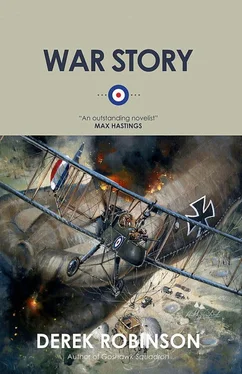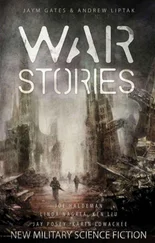“All right.” Paxton looked at Lacey and shared in the warm glow of the Public School Spirit. “Hell’s bells, what the devil, give me your pen,” he said, and witnessed the will. “It can’t be illegal,” he said,”because I’m not actually witnessing anything, am I?”
“You know, it’s time you put your own affairs in order,” Lacey said. “I’ll draft something for you to look at.”
Before the day was out, all the new aeroplanes were in the air. Everyone liked them. The German air force was up in strength and there was much skirmishing. Cleve-Cutler, three miles over the Lines, came across an elderly Rumpler two-seater that seemed to have lost something, it was wandering about so vaguely. He searched above, and eventually saw a tiny scuff in the sky, so small it could have been wiped away with a flick of a cloth. He left the Rumpler and spiralled up, climbing steeper and faster than the old FE could have managed, until the scuff grew wings, pale-blue and translucent. It was an Albatros. Just above it was another.
They came down to meet him and then seemed to change their minds and parted, one to the left and one to the right. Cleve-Cutler admired these simple tactics. Whichever plane he challenged, he would expose his tail to the other. He turned his back on them both and flew away. They chased for a mile and gave up. He circled, and climbed a little, and watched them watching him. He had plenty of fuel. Far below, through gaps in the cloud, he saw the Allied barrage, a wandering trail of brilliant sparks. It looked quite pretty. Like an expensive Christmas decoration.
At about the same time, ten miles to the north, Ogilvy and Essex found a splendid target.
The two FEs had been patrolling separately when each saw a blob coming out of the east. It grew to be three Aviatiks in arrowhead formation over a fourth machine, which Ogilvy identified through binoculars as a Roland CII. It was on reconnaissance duty. He could see the black box of the camera clamped to the outside of the observer’s cockpit.
The FEs attacked at the same time from opposite sides but by then the formation had broken. It was very smoothly done. One Aviatik climbed, the other two turned to face the. attacks, and the Roland dived towards the nearest cloud. There followed one of those hectic scraps that the pilots, if they survived, could never properly describe to Brazier because all they remembered was a flurry of images: planes that seemed to be sporting like swallows at one moment and charging head-first into a suicide pact the next; bright blurs of tracer, bending to chase a target; a swooping shadow; blood surging as the plane banked; the magnificent, exuberant hammering of guns; the panic of trying to look three ways at once and nearly colliding and screaming abuse and firing and missing; dragging the FE round in a turn so tight you think you can see your own tail; and thank God the air is empty behind. So you climb and hurt your neck by looking everywhere for everyone, but everyone has gone. The scrap lasted two minutes, maybe. How could the sky be crammed with fighting one moment and empty the next? When they landed, Ogilvy and Essex asked each other: “Where did you get to?” It wasn’t important. They’d got back, and now the scrap seemed like tremendous fun. It was only later, when one or other of them woke, far too soon, in the dreary stone-grey half-light before dawn, that terror got a bit of its own back.
Stubbs, flying with Goss, was probably the first to use the new pillar-mounted gun.
Before take-off they had agreed to try to lure an enemy machine onto their tail. Goss would fly fairly slowly and not too high, and Stubbs would be ready to unstrap himself and stand on his seat. After that, Goss would have to fly straight and level until Stubbs got down from his perch.
They crossed the Lines and wandered about, above cloud where the archie was blind. There was no lack of Huns but they were all too high or too low or too busy going elsewhere. After about twenty minutes an Albatros came wheeling in, out of range, nose gun blazing; as soon as Stubbs opened fire it curled away and dived for home. A novice, Goss decided. He also decided that this particular experiment wasn’t going to work. He opened the throttle and eased back on the stick to gain some height and automatically scanned the sky. With the corner of his eye he caught a glimpse of something drifting behind him; when he turned his head the glimpse had gone.
Stubbs moved fast. His legs were braced against the shove of the slipstream, his rump pressed against the front Lewis, and the Hun wasn’t even in range: just a silhouette, slim as a child’s kite. Stubbs waited. He enjoyed the luxury of not having the rushing air squeezing his face, and suddenly realised there were other advantages in firing backwards. The FE’s speed would actually help his bullets. So the Hun was in range after all. He fired off half a drum, marvelling at the way he just missed propeller and tail, and saw his tracer washing all over the enemy. That was all he saw. He blinked, and it was gone. No hope of giving chase. Stubbs climbed down, giving Goss a beefy grin.
After that the patrol was an anticlimax. Goss saw two distant scraps but they dissolved before he arrived. He became impatient; he wanted to try out his new fixed forward-firing Lewis.
The FE was a pleasure to dive. It cut through the thin curtain of archie like a locomotive through mist. Goss felt total confidence in the big Beardmore. From the way the wires and struts sang, he knew this was going to be a joyride. The rising countryside was spread out for his delight: he could choose what he wanted. He chose a field that was a town of tents and strafed it like a small mechanical storm, rising and dipping again and again to bring his gun to bear. Stubbs shot at anything that moved. It was all so easy. They heard bugles sounding the alarm, and saw men with their mouths open. Then the FE was gone, and Stubbs was busy reloading both guns. Goss found a column of infantry on the march and they shot it up too. Just point the bus and pull the trigger. You couldn’t miss. Rifle-fire chased him as he climbed high and went through the archie again, and flew home.
Cleve-Cutler had watched and waited a very long time. He was watching the decoy Rumpler, still pottering about down below, as well as the two Albatroses, who were loitering half a mile away. It would be foolish, he thought, to take on two of the enemy’s best fighters; but if he hung about long enough, anything might happen. Aircraft in various markings passed. All had their own business to attend to. None of this was very exciting. Far away, somebody’s business ended in a bright bead of flame strung on a long black thread of smoke. Now that must have been exciting.
A Gun Bus appeared, saw the Rumpler and changed course. The escort let it get close but not too close before they each dropped a wing and slid into a dive. Cleve-Cutler went down with them. It was an odd feeling, looking down on the decoy and the dummy, pressing your lips together against the rush of air trying to open them, feeling the controls stiffen as the speed built, knowing that in a few seconds these five machines would be mixed up in a wild tangle. The Gun Bus had seen what was coming and had turned away. Bad move. When attacked, always turn and face. Too late now.
One Albatros fell on the Gun Bus while the other tried to cut across Cleve-Cutler’s path and scare him off. Nothing worked. For a chaotic instant half a dozen streams of machine-gun fire crossed each other. Almost everyone missed. The Gun Bus decided, too late again, to keep turning and face the attack, and it wallowed in the wash of the first Albatros. The second Albatros got hit by some shots from the Rumpler that were meant for the FE, pulled out of its dive and began to make smoke. The Gun Bus, still wallowing, took a snap shot at the Rumpler and nearly hit the FE. Cleve-Cutler’s observer swore in fury and fired and nearly hit the Gun Bus. The Gun Bus put its nose down and fled. The damaged Albatros was leaving, escorted by its partner. That left the FE and the Rumpler, which was departing with all speed. Cleve-Cutler chased it and closed for the kill. His observer’s Lewis jammed after two shots; his own fixed Lewis jammed after ten. The whole thing was a balls-up. The Rumpier’s gunner was good and getting better with practice. Cleve-Cutler quit for the day.
Читать дальше












